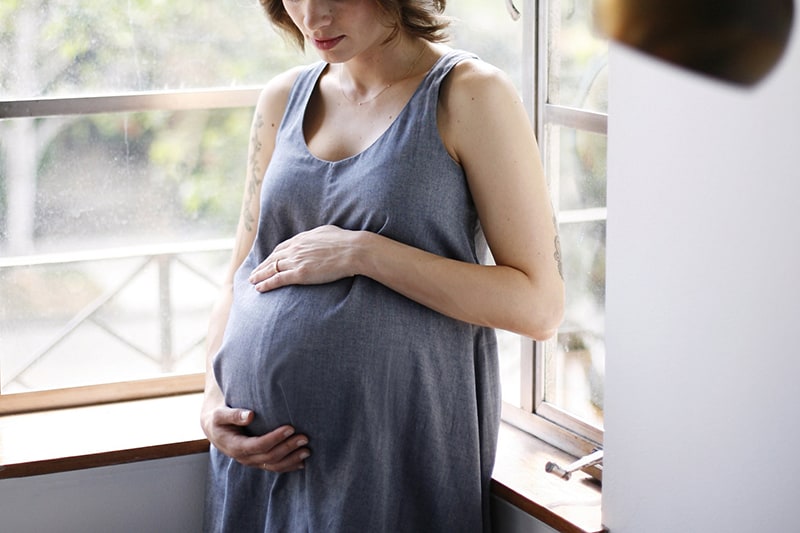
What You Need To Know About Pregnancy Over 35
Written by Sara Langer
Photography by PHOTOGRAPHED BY BELATHÉE PHOTOGRAPHY
The average age of first-time mothers in the United States has been rising steadily over the last few decades to the current all-time high of 26-years-old. In bigger cities, such as New York, DC, and San Francisco, the numbers are even higher, with the average age of first-time mamas settling anywhere from 28 to 31-years-old. One big reason: Women are choosing to develop their professional lives in their twenties, resulting in more and more babies born to women in their thirties and forties.
While many women would agree that they aren’t ready to have a child in their early twenties, their bodies are more primed for baby-making, as fertility slowly begins to decline by one’s mid-twenties, with a rapid decline starting after 35-years-old. Of course, thanks to improved prenatal care and medical testing, many woman safely have babies later in life. In fact, 11% of all babies in the United States are born when their mothers are at least 35-years-old. To learn a little bit more about the facts around pregnancy after 35 we turned to Dr. Kelly Shanahan, OB/GYN, and her book, Your Over-35 Week-by-Week Pregnancy Guide: All the Answers to All Your Questions About Pregnancy, Birth, and Your Developing Baby. Here is what we learned.
Head to the doctor before “trying.” The first thing you should do is make an appointment with your OB/GYN and your general-medical doctor to get an idea of your overall health. Women over 35-years-old are more likely to have chronic conditions that could affect their pregnancy. Even if you’ve been pregnant before, it’s a good idea to take the pulse of your current state of health. Be prepared to answer questions about your medical history and if you know about the medical history of people in your family, that is very helpful, too. You’ll also discuss your lifestyle, both past and present, to determine if there is anything that could create greater risk in your pregnancy. Depending on your age, you and your doctor might discuss fertility testing before you start trying, so you have an idea of where you are starting.
Focus on your personal health. If you aren’t already pregnant, now is the time to focus on yourself to make sure your body and mind are in the healthiest state possible on their own before adding another human to the equation. This is important for any woman intending to get pregnant, no matter her age. If you’re over 35, it might just be that you have to work a little bit harder to hit your health goals. Eat a well balanced diet, stay active, and begin to increase your consumption of folic acid and DHA. You can start taking a prenatal vitamin before you begin trying. Although the research is fuzzy on the link between stress and infertility, we say it can’t hurt to try to reduce your stress, too.
Know the facts about fertility, but don’t let it get you down. In Dr. Shanahan’s book she writes: “In any given month, a woman in her early twenties has a 25% chance of getting pregnant. In her late twenties to early thirties, that drops to 15%. Over-35-year-olds have only a 10% chance in any given month, and that drops to 5% after age 40.” Close to 95% of women in their twenties should be able to conceive within a year of trying, averaging 4-5 months to do so. For women over 35-years-old, the percentage of those able to get pregnant within a year of trying drops to 65-70%, and the average amount of time it takes is one full year. About 10-15% of all couples, regardless of age, will encounter challenges on the road to getting pregnant, but a third of women between 35 and 40 and half of women over 40 will be diagnosed with infertility. All that being said, the best way to start your journey to conception is the old-fashioned way, so have fun. Try not to stress about it too much and enjoy the intimate moments with your partner. If you’ve been trying consistently for 6 months and you haven’t gotten pregnant, then it might be time to speak with your doctor about beginning an infertility investigation.
Get in tune with your ovulation. Sure, we all know how babies are made, but that doesn’t mean that it can happen just any day of the week. Being in tune with your ovulation cycle will help increase your chances of getting pregnant. The sperm will need to fertilize the egg within 24 hours of ovulation, so knowing when this happens is extremely helpful. Dr. Shanahan recommends trying an ovulation predictor test kit (OPK) which can give you a heads up by a day or two of when ovulation will occur. This way you can make sure you’re trying at the most optimal time. But don’t limit sex with your partner to only these times. That can put a lot of pressure and stress on both of you, which will not help your chances. While the egg needs to be fertilized within 24 hours of ovulation, sperm can survive for up to 5 days in the reproductive tract, although most only survive 1 or 2 days. Your chances of conceiving will be the highest when you ovulate, but there is still a possibility of getting pregnant a day before or after as well. This is known as your “fertile window.”
Know the risks involved. Many women over the age of 35 have completely healthy, risk-free pregnancies, but being aware of the possible risks can help you stay on top of your health and prenatal care to manage any troublesome symptoms should they arise. Some of the more common health risks include higher rates of miscarriage (20% for those over 35 and 30% for those over 40), significant high blood pressure or preeclampsia, gestational diabetes, placenta previa, and an increased chance of having a C-section. Other risks that are common include premature birth, low birth weight, and the chances of a chromosomal abnormality (which can be determined through testing early in the pregnancy). And this one may be a shocker—woman who are successful getting pregnant later in life have a higher chance of carrying multiples, even without fertility treatments! While extremely exciting, being pregnant with more than one baby has its own set of risks to be aware of.
Pay attention to your emotional health. During pregnancy most women experience an extreme range of emotions brought on by the hormonal fluctuations taking place in their bodies. Older women are likely to have more intense and drastic fluctuations resulting in significant changes in mood and emotion that can have an effect on the overall well being of mom and baby. If the emotions become too much to handle or are having an effect on your everyday life, it’s important to speak with your doctor about it. It’s completely normal and something not to be ashamed of. It can be much easier to brush these types of challenges under the rug versus medical risks that are more easily measured, like high blood pressure, but taking care of your emotional health should be just as much a priority.
Celebrate your age, too. Yes, it is true that there are more inherent risks when a woman gets pregnant in her late thirties or beyond. And it is also true that it can be much harder to make an actual pregnancy happen. But that doesn’t mean that countless women haven’t had completely healthy and risk-free pregnancies later on in life. Every woman’s body and every pregnancy is different, no matter the age of the mother. There are certainly women in their late thirties who lead much healthier lifestyles than those in their twenties. They’ve had more life experience and are likely more financially stable than younger women. There are definitely benefits to having your children later in life. Embrace your age, take care of yourself, and celebrate your body. Hopefully all of this will help you in your journey to a healthy pregnancy.
Share this story




